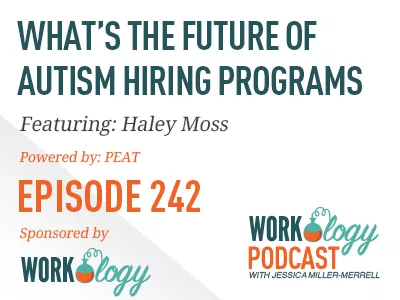One of the most popular articles on the Workology site is about autism hiring programs. I wrote the article while working with a technology startup that provided resources for caregivers of children who had disabilities and needed access to resources and support. It’s been one of our most popular articles for job seekers and their family members who identify as autistic. However, there is a lot of debate about autistic-specific hiring programs and the types of jobs they can or cannot do. That’s what we’re talking about today. This podcast is produced in partnership with PEAT and is part of their Future of Hiring series.
Episode 242: What’s the Future of Autism Hiring Programs with Haley Moss (@haleymossart)
This episode of the Workology Podcast is part of our Future of Work series powered by PEAT, the Partnership on Employment & Accessible Technology. In honor of the 30th anniversary of the Americans with Disabilities Act this year, we’re investigating what the next 30 years will look like for people with disabilities at work, and the potential of emerging technologies to make workplaces more inclusive and accessible. Today, I’m joined by Haley Moss.
Haley is the author of “Middle School: The Stuff Nobody Tells You About” and “A Freshman Survival Guide for College Students with Autism Spectrum Disorders: The Stuff Nobody Tells You About.” She also illustrated and contributed to the anthology “What Every Autistic Girl Wishes Her Parents Knew.” Her writing about autism, neurodiversity, and disability has appeared in publications such as The Washington Post, ABA Journal, HuffPost, Teen Vogue, FastCompany, and more. Haley also co-hosts the Spectrumly Speaking podcast, which is dedicated to women on the autism spectrum. In addition, she a has forthcoming scholarship on lawyers with disabilities, disability’s intersection with standardized testing, as well as on crimes against disabled children.
She currently serves on the Florida Bar for Young Lawyers Division Board of Governors, the constituency board for the University of Miami – Nova Southeastern University Center for Autism and Related Disabilities and the Board of Directors for Different Brains, is the Chair of the Unicorn Children’s Foundation Junior Board, and is a co-chair of the Miami-Dade Chapter of Florida Association for Women Lawyers diversity committee.
Debunking the Autism Stereotype in Hiring
When I think of autism hiring programs I think of coding, programming, video editing, or working at a bakery or car wash. I ask Haley about this and if this pigeonholing is something that she agrees with and if not what types of jobs and skills to people who are neurodiverse do best. Haley shares that this stereotype is something that she is not in agreement with. First thing, she says that these companies and employers that offer these specific programs have good intentions but they are not ones she is in agreement with. She would love to see more employer programs that provide professional development and mentorship for led by autistic people. She also suggests that employers invest in trainings that aren’t focused on the deficits of autistic people, but how individuals can do better working with them, She wants to see more employers offer more training and support for managers and leaders instead, she says off as awkward.
When Should Employees or Candidate Disclose Their Disability?
Haley is in a unique position as an attorney and also someone with a disability. I asked her when individuals should disclose. I know that many people are extremely nervous and concerned that their disability could impact being hired or employability. Haley says for herself, she discloses pretty quickly because a quick internet search by the individual gives them lots of information. She also says that the best time is often when they need an accommodation. Having that conversation right away is important because the individual can share with the manager what they need. Maybe it’s a different communication style or other request. She says when you position it this way you’re not just asking for an accommodation. The person is saying that this change is going to help the manager and it’s going to help the individual do better at their job. Talking this way puts a self advocacy spin both on the employee and the employer. Haley says you can frame your request with or without disclosing.
[bctt tweet=””The best time to disclose is when you need an accommodation.” – @haleymossart #podcast #accomodation, #shrm ” via=”no”]
Conclusion
Every employee is unique. No one wants to be put in a box which is why I appreciate Haley’s story. I love her insights and experience in this area and her ability to put her legal hat on to help us talk about autism hiring programs. As HR leaders, I think we all know that stereotyping is not effective or welcomed. This interview is also a great reminder of what we need.
The future of work series in partnership with PEAT is one of my favorites. Thank you to PEAT as well as our podcast sponsor Workology.
Connect with Haley Moss on LinkedIn.
RECOMMENDED RESOURCES
- Haley Moss’ website
- JAN – Job Accommodation Network
- 27 Companies with Autism Hiring Programs
- Ep 218: Creating Jobs for People with Disabilities
- Virtual Workplace Accessibility Guide
- Podcast Transcript
How to Subscribe to the Workology Podcast
Stitcher | PocketCast | iTunes | Podcast RSS | Google Play | YouTube | TuneIn
Find out how to be a guest on the Workology Podcast.








